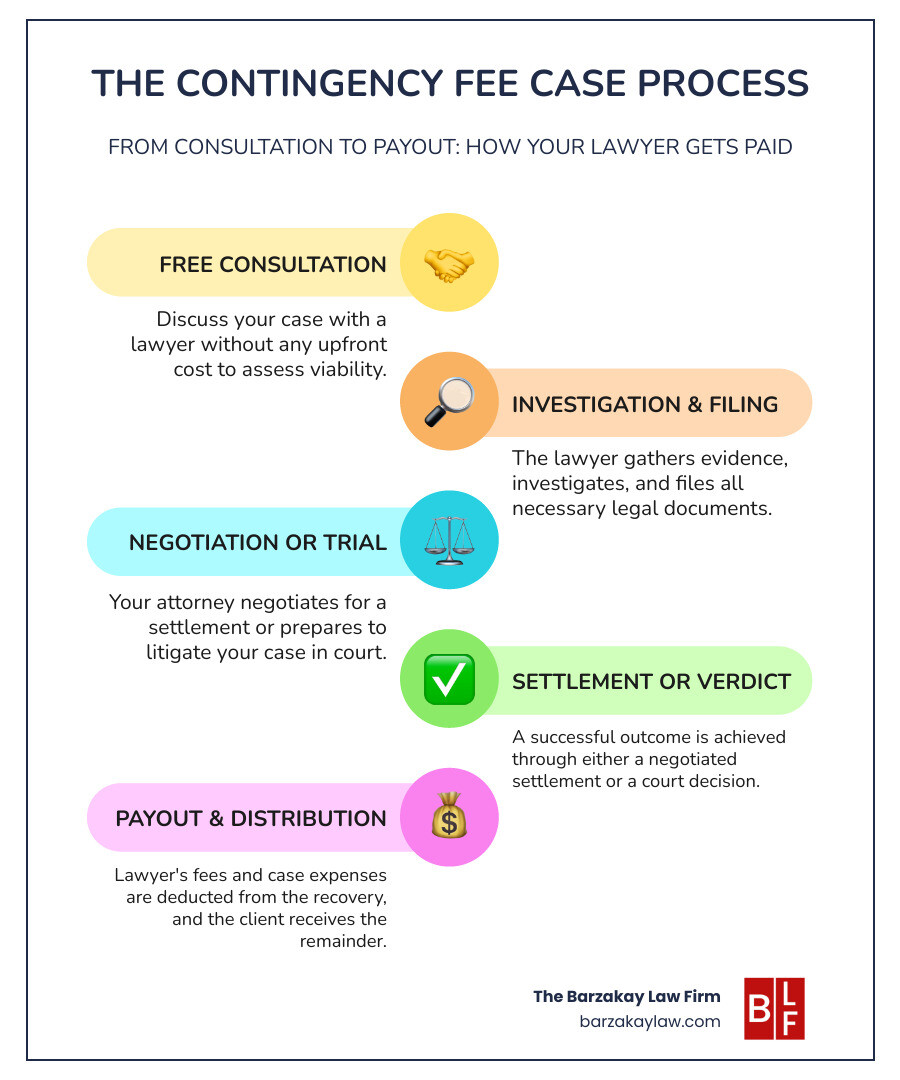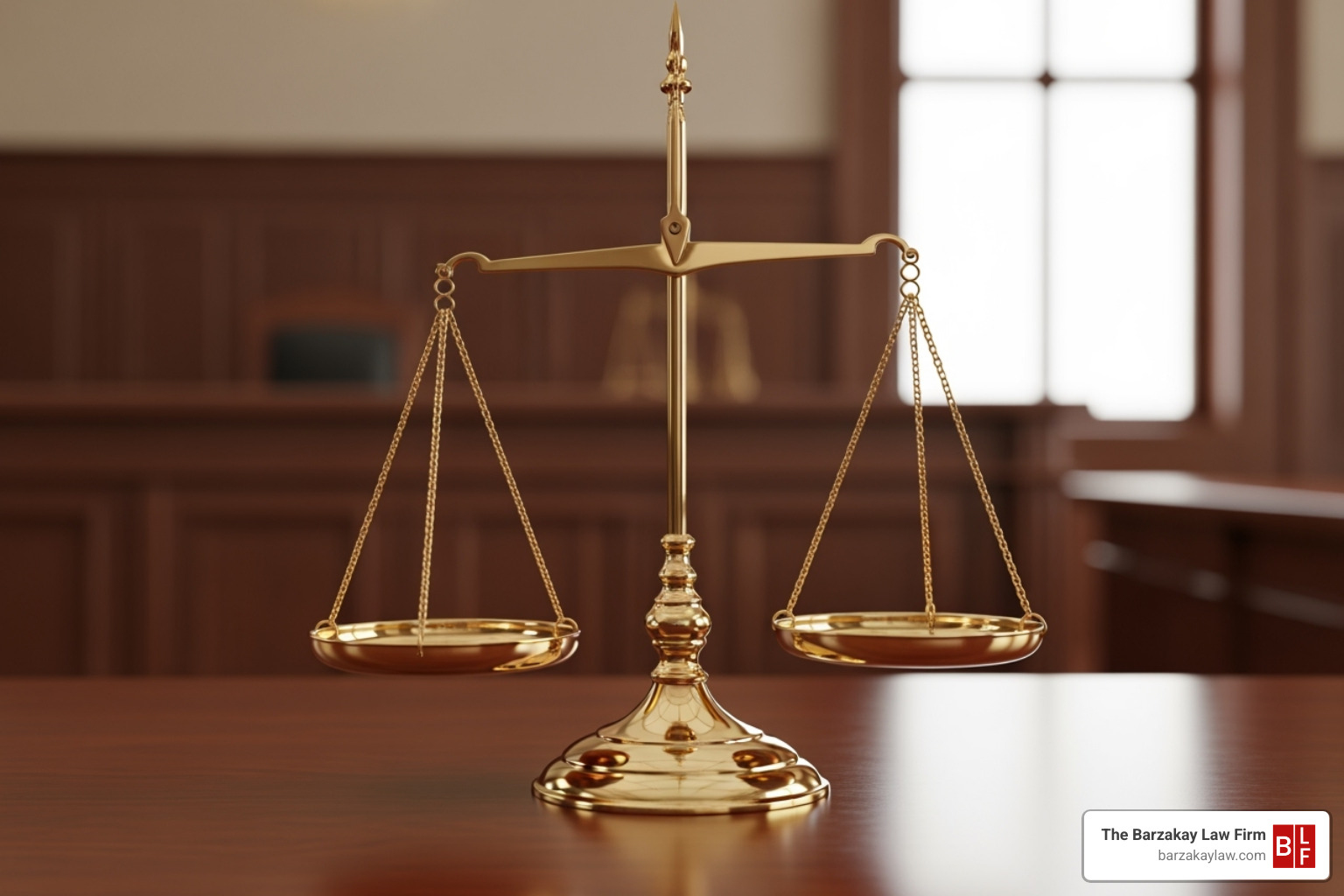What is a Contingency Fee Lawyer and How Do They Work?
A contingency fee lawyer is an attorney who only gets paid if they win your case or secure a settlement. This payment structure removes the financial barrier that can prevent families from seeking justice after an accident.
Quick Answer: Key Facts About Contingency Fee Lawyers
- No upfront costs – You pay nothing until your case is won
- Typical fees – Usually 33% to 40% of your settlement or award
- Common cases – Personal injury, car accidents, wrongful death claims
- Payment timing – Fee comes out of your final compensation
- Risk-free – If you lose, you don’t pay attorney fees
When facing medical bills and other costs after an accident, affording legal representation shouldn’t be another worry. The contingency fee model ensures everyone has access to effective legal help, regardless of their financial situation.
Most personal injury lawyers in South Florida, including those handling wrongful death cases in Hollywood, Miami, and Boca Raton, work on this basis. This means your lawyer’s success is directly tied to yours. They only earn money when they recover compensation for your family.
The standard contingency fee ranges from 33.3% to 40% of the recovered amount. For instance, on a $300,000 settlement with a 33% fee, the attorney would receive $100,000, and you would receive $200,000, minus case expenses.
This arrangement motivates your attorney to pursue the maximum possible compensation, as their payment depends on a successful outcome for you.
Contingency fee lawyer terms to know:
Defining the Contingency Fee
A contingency fee means our payment as your lawyers is “contingent” on achieving a favorable result. If we don’t win your case, you don’t pay a fee for our legal services. This “no win, no fee” arrangement is a cornerstone of how we operate at The Barzakay Law Firm.
This model allows us to represent individuals who might otherwise be unable to afford legal counsel after an injury. Instead of upfront retainers or hourly rates, we accept a percentage of the award from a settlement or judgment. This aligns our interests with yours: we only get paid if you do.
Contingency fees are overwhelmingly common in personal injury cases, including car accidents, slip and falls, medical malpractice, and wrongful death claims. These cases often involve victims burdened with medical expenses and lost wages, making upfront legal fees an impossible hurdle.
For more information on how personal injury cases can be resolved, you can explore More info about personal injury mediation & arbitration.
How the Fee Structure Compares
Understanding the different ways lawyers charge for their services can be confusing. When you’re looking for a contingency fee lawyer, it’s helpful to see how this model stacks up against other common fee structures like hourly rates and flat fees.
| Feature | Contingency Fee | Hourly Rate | Flat Fee |
|---|---|---|---|
| Payment Timing | Only if you win/settle | Ongoing, as work is performed | Upfront, before work begins |
| Upfront Cost | None for attorney fees | Often requires a retainer (down payment) | Full payment upfront |
| Risk Assessment | Lawyer assumes financial risk; incentivized to win | Client assumes financial risk; cost can be unpredictable | Client assumes financial risk; cost is predictable for defined services |
| Case Types | Personal injury, wrongful death, medical malpractice, workers’ compensation, other money claims | Complex litigation, business law, defense cases, family law (non-contingent) | Simple wills, uncontested divorces, traffic tickets, adoptions |
| Lawyer Motivation | Directly tied to successful outcome and amount recovered | Tied to hours worked | Tied to completion of specific service |
As you can see, the contingency fee lawyer model stands out because it shifts the financial risk from you to your legal team. This means you don’t have to worry about accumulating legal bills while your case is ongoing. Our focus is squarely on getting you the compensation you deserve.
Typical Contingency Fee Percentages
When discussing contingency fees, people often ask about the percentage. While there’s no single number, there is a widely accepted range. In most personal injury cases, the standard fee for a contingency fee lawyer is 33.33% (one-third) to 40% of the total recovery. This percentage is agreed upon upfront and detailed in our written agreement.
The fee isn’t always a fixed percentage. It can be structured on a “sliding scale,” meaning the percentage might change depending on certain factors:
- The stage of resolution: A case that settles quickly, before a lawsuit is filed, may have a lower percentage. If the case proceeds to litigation or trial, requiring more time and resources, the percentage might increase.
- The amount of recovery: In some instances, the percentage might decrease as the recovered amount gets larger. This tiered structure can ensure clients receive a larger portion of very high settlements or awards.
The specific percentage depends on factors like the time and effort required, case complexity, and the likelihood of success. Our goal is to achieve a favorable outcome for you, and our fee structure reflects that commitment.
Understanding these percentages is crucial when considering how to maximize your settlement offer. You can learn more by reading our guide on How to maximize your settlement offer.
The Financial Details of a Contingency Agreement
Working with a contingency fee lawyer involves more than just the fee percentage. It’s important to understand all the financial details. We believe in being completely transparent so you know what to expect.
Understanding Fees vs. Costs
It’s important to distinguish between attorney’s fees and case costs.
First, there are attorney’s fees. This is what our legal team earns for the work put into your case. It’s the agreed-upon percentage of your recovery, covering our time and knowledge.
Then, there are case expenses, or “disbursements.” These are the costs required to move your case forward and are separate from our attorney’s fees.
At The Barzakay Law Firm, we typically advance these costs, so you don’t pay out-of-pocket while your case is ongoing. These costs are usually reimbursed from your settlement or award.
Here are some common costs in a personal injury case:
- Filing fees: Charges paid to the court to start a lawsuit or file documents.
- Professional witness fees: Costs for professionals like doctors or accident reconstructionists to provide reports and testimony.
- Deposition costs: Fees for court reporters and transcripts for sworn, out-of-court statements.
- Medical records: Costs for obtaining your medical bills and records.
- Investigation costs: Expenses for gathering evidence like accident reports and photos.
- Minor office costs: Postage, copying, and legal research expenses.
While our attorney’s fees are contingent on winning, your responsibility for case expenses can vary. In most of our contingency cases, if we don’t recover money for you, you won’t owe these advanced costs. This detail will be clearly stated in your retainer agreement.
The Importance of the Written Retainer Agreement
The retainer agreement is the contract between you and your contingency fee lawyer. This document is vital because it clarifies everything, protects your rights, and outlines our duties.
As required by professional rules, a contingency fee agreement must always be:
- In writing: A formal, written document is mandatory.
- Signed by you, the client: Your signature confirms you understand and agree to the terms.
- Clearly state how our fee will be figured out: It will detail the percentage we receive and how it might change (e.g., a sliding scale).
- Clearly tell you about any expenses you might be responsible for: This section explains how case costs are handled and when they are paid back.
The agreement explains our services and how we will work together. We will review it with you, answer your questions, and ensure you are fully informed before you sign. This transparency is central to how we serve clients in Hollywood, Miami, and throughout South Florida.
The American Bar Association has rules for lawyers, called the ABA Model Rules of Professional Conduct, which help ensure these agreements are fair and protect you.
Understanding this agreement is also key when deciding whether to accept a settlement vs. trial.
How Your Final Payout is Calculated
How your final payout is calculated significantly impacts the amount you receive. The key difference is whether the attorney’s fee is calculated on the “gross settlement” (total recovery) or the “net settlement” (the amount after case expenses are deducted).
Let’s look at an example:
Imagine your contingency fee lawyer secures a $100,000 settlement. Case expenses total $20,000, and the agreed-upon contingency fee is 33.33% (one-third).
Scenario 1: Fee Calculated BEFORE Expenses (from the Gross Settlement)
- Total Settlement: $100,000
- Lawyer’s Fee (33.33% of $100,000): $33,333
- Money left after Fee: $100,000 – $33,333 = $66,667
- Then, take out Case Expenses: $66,667 – $20,000 = $46,667
- Your Final Payout: $46,667
Scenario 2: Fee Calculated AFTER Expenses (from the Net Settlement)
- Total Settlement: $100,000
- First, take out Case Expenses: $100,000 – $20,000 = $80,000 (This is the “net” amount)
- Lawyer’s Fee (33.33% of $80,000): $26,666
- Your Final Payout: $80,000 – $26,666 = $53,334
As the example shows, calculating the fee after expenses can result in a higher payout for you. We prioritize your interests, and this is an important detail we will discuss with you. Our goal is to maximize your recovery.
For more details on how these amounts are figured out, you can check out our guide on Calculating damages in car accident cases.
Evaluating the Pros and Cons
Understanding how a contingency fee lawyer works involves weighing the pros and cons. We believe in transparency so you can make the right choice for your situation.
Benefits for the Client
The contingency fee lawyer approach offers significant advantages, especially for those dealing with serious injuries.
No upfront financial risk is a major benefit. You pay no attorney’s fees unless we win or settle your case. This allows you to seek justice without added financial stress from medical bills and lost wages.
The model provides access to justice for everyone. Without it, many people could not afford to challenge large insurance companies or corporations. It levels the playing field, ensuring anyone can get legal help when harmed by others.
It creates a strong motivation for your lawyer to win. Since we only get paid if you do, our success is tied to yours. We are driven to work diligently and fight for the most favorable outcome and maximum compensation for your case.
Finally, having a contingency fee lawyer levels the playing field against insurance companies. These companies have vast resources and legal teams. With us by your side, you get strong legal representation to protect your rights and ensure your voice is heard.
Understanding the financial impact of an accident is critical. Learn more about The financial impact of a car accident.
Potential Downsides and Criticisms
While the benefits are clear, it’s fair to consider some criticisms of the contingency fee model.
A potential downside is a higher effective fee on simple cases. For a straightforward case that settles quickly, the percentage fee might be more than an hourly rate would have been. This is the trade-off for the lawyer assuming all upfront financial risk and costs, regardless of the case’s complexity.
Another point is lawyer selectivity. Because we take on the financial risk, we must carefully evaluate each case. We may decline a case if the chances of winning are low or the potential recovery doesn’t justify the investment of time and resources. This is a practical decision, not a judgment on your injury’s validity, and it allows us to fully commit to the cases we accept for clients in Hollywood, Miami, and Boca Raton.
Some suggest a potential for premature settlement, where a lawyer might push to settle quickly. However, our ethical duty is to you, and the final decision to settle is always yours. We provide our professional recommendation, but you have the final say. Our goal is to maximize your compensation, and we are prepared to fight for what is fair.
Ethical Rules and Prohibited Cases
When working with a contingency fee lawyer, know that strict ethical rules guide our handling of your case. These are binding professional standards designed to protect you and ensure fair representation.
These rules act as a safety net, providing extra protection for injured clients against potential conflicts of interest or unfair practices.
What are the ethical considerations for a contingency fee lawyer?
At The Barzakay Law Firm, we take our ethical obligations seriously, and they shape every interaction from our first conversation to the final resolution.
Reasonableness of fees is a key principle. While Florida has no universal cap, fees must be fair based on case complexity, time invested, and the result. A simple case shouldn’t have the same fee structure as a complex one that takes years.
Written agreements are mandatory. We document everything clearly so you know exactly what to expect.
We are required to maintain clear communication. This means explaining legal terms, avoiding surprise costs, and providing regular updates. Clear communication is vital for our clients in Hollywood, Miami, and across South Florida.
At your case’s conclusion, we must provide a final written statement detailing the total recovery, our fee calculation, all deducted expenses, and your final net amount. Transparency is paramount.
These ethical standards come from the Model Rule 1.5(d) on prohibited fees, which most states have adopted to ensure client protection.
When are contingency fees not allowed?
Certain cases cannot be handled on a contingency basis. A contingency fee lawyer is prohibited from these arrangements to prevent conflicts of interest that could harm clients or undermine the legal process.
Criminal defense cases are prohibited. Tying payment to an acquittal could create pressure to compromise a defense, which is unethical when a person’s freedom is at stake.
Domestic relations matters, including divorce cases, are also prohibited. Lawyers cannot charge based on the amount of alimony or property secured, as this could discourage reconciliation or create improper incentives.
Child custody cases are also restricted. A lawyer’s focus must be on the child’s welfare, not on a financial outcome tied to the custody arrangement.
These prohibitions are logical. In personal injury cases, aligning our financial interests with yours creates the right incentives. But in family law or criminal defense, those same incentives could work against your true interests.
Frequently Asked Questions about Hiring a Contingency Fee Lawyer
Choosing legal representation is a major decision, especially after an injury. Here are answers to common questions about working with a contingency fee lawyer.
What happens if I lose my case?
The answer is straightforward: if we don’t win your case, you don’t pay our attorney’s fees. This is the core of the “no win, no fee” promise.
However, remember the case expenses (filing fees, record costs, etc.) are separate from attorney’s fees. Your retainer agreement will specify whether you are responsible for these costs if the case is not successful.
We will explain this in detail during our initial meeting. We believe in complete transparency, with no surprises.
Can I negotiate the contingency fee percentage?
Yes. While there are standard ranges, the percentage is not set in stone and can be negotiated. We are open to discussing what is appropriate for your situation.
Factors influencing the fee include case complexity and the likelihood of a trial. A straightforward case may have a lower percentage, while a more complex case requiring litigation may have a higher one to reflect the added work and risk.
A sliding scale arrangement is another option, where the fee percentage changes based on the stage of resolution. A pre-lawsuit settlement may have a lower fee than a case that goes to trial, ensuring the fee reflects the work performed.
The key is having an honest conversation to find an arrangement that feels fair to everyone. For more details about how fees work in specific types of cases, you can check out our guide on slip and fall lawyer fees.
What types of cases are usually handled on contingency?
The contingency fee lawyer model is ideal for cases where you are seeking monetary damages. If there is no financial recovery, there is no fee.
Personal injury cases are the largest category, including everything from slip and falls to complex medical malpractice claims. Car accidents are particularly common.
Medical malpractice cases often use contingency fees because they are expensive to pursue, frequently requiring costly professional testimony that most families cannot afford upfront.
Wrongful death claims also rely on contingency fees. Grieving families facing funeral costs and lost income should not have the added burden of legal bills.
Here in South Florida, we also handle workers’ compensation claims and other injury cases on a contingency basis. While our firm focuses on personal injury, contingency arrangements can extend to other areas. You can learn more by reading about business contingency lawyers.
The common thread is that someone has been harmed through no fault of their own and deserves compensation. The contingency model ensures financial barriers don’t prevent them from seeking justice.
Finding the Right Representation in South Florida
An unexpected injury causes physical pain and financial stress. In Hollywood, Miami, and across South Florida, we believe pursuing justice shouldn’t be an added financial burden. This is where the contingency fee lawyer model is essential.
This payment structure removes upfront financial barriers, giving everyone the opportunity to seek the compensation they deserve. Understanding these agreements is the first step toward finding the legal help you need.
At The Barzakay Law Firm, we are committed to this client-focused approach. We handle personal injury cases on a contingency basis, aligning our goals with yours. We don’t get paid unless you do, so we are focused on achieving a favorable outcome and securing the compensation you need. Your success is our success.
If you or someone you care about has been injured, don’t let financial worries stop you from exploring your legal options. Reach out to us. We’re here to help you understand how a dedicated personal injury attorney in Hollywood can assist you in securing the justice you deserve in your South Florida community.




